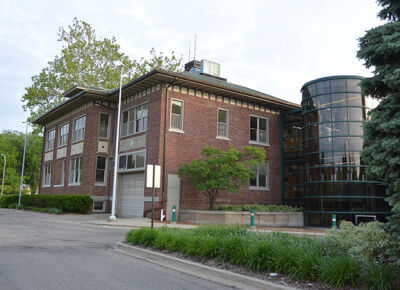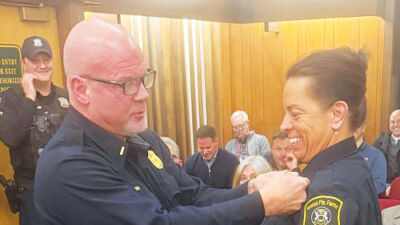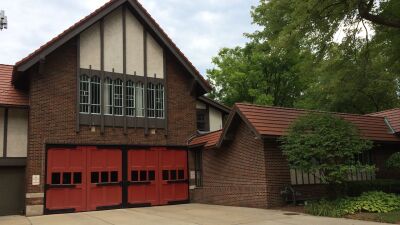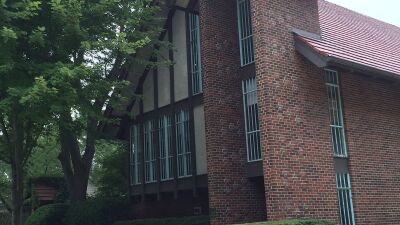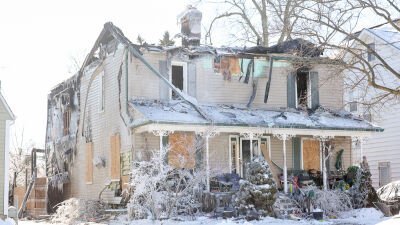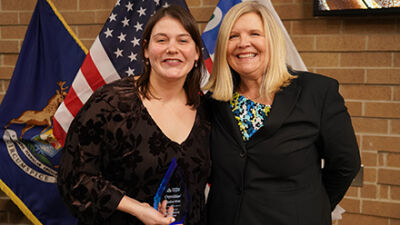GROSSE POINTE PARK — Grosse Pointe Park officials say they’ve been happy with the response they’ve gotten thus far to having Medstar provide its emergency medical services and ambulance.
“It’s been great,” Public Safety Director James Bostock said during an April 14 Park City Council meeting.
Bostock said it will be two years in July since the Park switched to Medstar. Prior to that, the city operated its own ambulance.
Medstar CEO Colby Miller presented the findings of Medstar’s 2024 report on service in the Park to the council. He said Medstar also provides emergency medical services to Grosse Pointe City, Grosse Pointe Farms and Grosse Pointe Woods. Grosse Pointe Shores operates its own ambulance.
The report shows that the average response time in the Park was six minutes and 15 seconds last year. For nonemergencies, the average response time was 11 minutes and nine seconds.
“Overall response times in the community are good,” Miller said.
Miller said 93% of calls were deemed nonemergencies. He said the Park’s dispatchers determine whether a call is an emergency or not, based on responses to questions they ask the caller.
City Councilwoman Christine Gallagher recounted a story about a friend who was having trouble breathing and waited 30 minutes for an ambulance. She said police stayed with her friend the whole time, which means those officers weren’t able to be on the road during that time.
Miller said breathing difficulty “is a great divider” in the emergency medical field, because it’s not always a symptom of a life-threatening problem.
“We just follow the national standards … for emergency response,” Miller said.
Miller did express concern about the length of the wait and said he’d look into it.
Miller said the emergency medical community is reevaluating the practice of racing, lights and sirens on, to take patients to the hospital.
“There is no connection between response time and critical outcomes,” Miller said. “What matters is clinical care (on the scene).”
Starting care and medicine — if needed — at the scene, as well as communicating the patient’s status with the awaiting hospital, is more important and more likely to lead to better outcomes, he said. For example, Miller said a patient who’s taken directly to the hospital’s catheterization lab, because it was prepped and ready for the patient, shaves about 15 minutes off the time the patient might have otherwise waited for appropriate treatment.
City Councilman Max Wiener said his wife is an emergency room doctor and is familiar with many ambulance companies, including Medstar.
“She had a very high opinion of Medstar,” Wiener said.
He agreed with Miller that the ability to start giving a patient medicine and communicate the patient’s condition effectively with the hospital “is more important than how rapidly they get them to the emergency room.”
The report met with a positive reaction from some Park officials.
“It gives me confidence we’re in good hands,” Mayor Michele Hodges said. “There’s nothing more important than the health and safety of our residents.”
The report shows that there were no service or clinical complaints against Medstar from Park patients in 2024, and patient satisfaction based on surveys was 98.1% positive.
In southeast Michigan, Miller said, all ambulances have advanced certified paramedics, which means they can start administering medicine to a patient before the patient reaches the hospital.
“There is a difference between an EMT and a paramedic, and it’s night and day,” Bostock said.
Miller said there was one incident in which a Medstar crew member wasn’t respectful to public safety officers. After evaluating the situation and determining that these claims were accurate, Miller said Medstar fired that person the next day.
Hodges said switching to Medstar has saved the Public Safety Department on overtime costs and has improved morale. Bostock agreed, adding that the city was satisfied with the quality of service it was getting from Medstar.
Miller said Medstar gives back to the communities it serves, raising money for AEDs and donating those to schools, churches and other venues that need them.
Hodges asked if the city was at the point where it could consider selling its old ambulance. City Manager Nick Sizeland said they could look into that.
“That could be something we could bring to auction,” Sizeland said.
 Publication select ▼
Publication select ▼